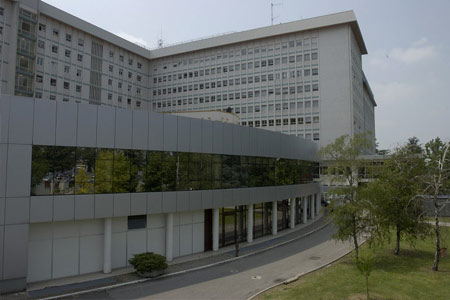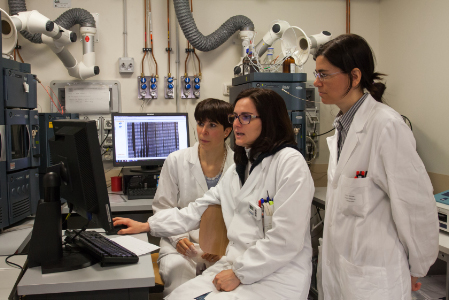B cell–activating factor (BAFF)/B lymphocyte stimulator (BLyS) is a member of the tumor necrosis factor (TNF) superfamily of cytokines. BAFF/BLyS plays a fundamental role in B-cell development and function. It is produced mainly by stromal cells and by cells of myeloid origin, such as dendritic cells, monocytes/macrophages and neutrophils. Deregulated production of this cytokine seems to be involved in the development of autoimmune disorders in both mice and humans, but the mechanisms responsible for this phenomenon have been poorly investigated to date. In the past years, we have characterized the production of BAFF/BLyS by human neutrophils and have developed a strong interest in studying the mechanisms by which the production of BAFF/BLyS by myeloid cells is regulated in both physiological and pathological conditions. We decided to further investigate the role of BAFF/BLyS production by myeloid cells in the development of autoimmune disorders by utilizing Lyn-deficient mice (lyn-/- mice) as experimental model for these pathologies. Lyn is a Src-family kinase member present in B-lymphocytes and myeloid cells. Lyn-/- mice develop a progressive lupus-like autoimmunity that, so far, has been mainly attributed to B-cell abnormalities. In addition, lyn-/- myeloid cells also manifest a hyper-activated phenotype but the contribution of these cells to the development of autoimmunity, in such a model, has been poorly investigated to date. In this context, we recently found that overproduction of BAFF/BLyS by hyper-activated lyn-/- innate immune cells, mainly in response to Interferon gamma (IFNgamma), strongly contributes to the development of inflammation/autoimmunity in lyn-/- mice. In line with this observation, genetic deletion of IFNgamma dramatically reduced BAFF/BLyS serum levels and ameliorated autoimmunity in this model. Furthermore, blocking BAFF/BLyS activity ameliorated autoimmunity, while treatment with IFNgamma increased BAFF/BLyS serum levels and accelerated the development of autoimmunity in lyn-/- mice. In summary, the data that we have obtained suggest that deregulated production of BAFF/BLyS by hyper-active lyn-/- myeloid cells may be a major cause/contributor of autoimmunity in this model not only by supporting B-cell activation, but also by establishing an inflammatory loop involving T-cell derived IFNgamma. The latter cytokine can, in turn, induce more BAFF/BLyS by myeloid cells and therefore further exacerbate autoimmunity. This “vicious” interaction between myeloid cells, BAFF/BLyS and T cells might have an important pathological role not only in Lyn-deficient autoimmunity, but also in other autoimmune disorders. Indeed, T- and myeloid cell activation/proliferation, as well as higher production of BAFF and IFNgamma, have often been observed in both mice and human patients with lupus-like disorders. We are now trying to answer to the numerous questions that are still opened to better characterize this phenomenon. For example, given the crucial pathological role of B cells in lupus-like autoimmunity, it is still not clear whether the trigger/propagation of this inflammatory loop is only a secondary consequence of the activation status of auto-reactive B cell (possibly sustained by the elevated BAFF/BLyS serum levels) or intrinsic to a pathologic interaction between activated myeloid cells and T cells. Goal of this study is therefore to further investigate the mechanisms of the regulation and the pathological relevance of the inflammatory loop involving myeloid cells and BAFF/BLyS as possible important players in lupus-like diseases. The study will be performed mainly in lyn-/- mice but the main findings will be extended also to other mouse models of lupus-like autoimmunity. We believe that the results of this study will give new insights on the pathogenic mechanisms that regulate the cross-talk between innate and adaptive immunity in autoimmune disorders







